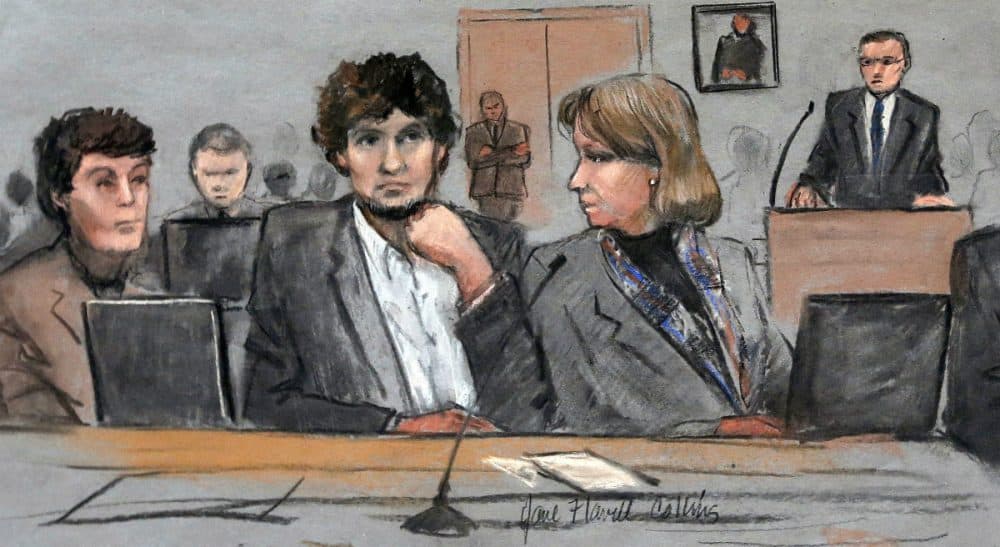Advertisement
Why We Needed To Hold A Trial For The Boston Marathon Bomber

Since the guilty verdicts were announced earlier this week in the criminal trial of the Boston Marathon bomber, several observers have raised the question of whether the trial was worth conducting. Why didn’t the government accept a guilty plea, settle for life in prison, and call it a day?
It was important for the United States to demonstrate that we hold fair and open...trials. It was important to show that we do not beat suspects into entering guilty pleas...We do not put defendants into cages inside our courtrooms.
That approach, according to these critics, (who include former federal trial judge Nancy Gertner), would have spared the public the expense of the two-year legal proceeding and eliminated even the sliver of a chance that the defendant, Dzhokhar Tsarnaev, might have been found not guilty. Especially since his defense team admitted his role in the crimes, a trial was unnecessary.
I disagree. No matter what the cost, the trial was worthwhile. Its value cannot be measured in money alone.
The trial — which is now in the penalty phase, to determine whether Tsarnaev should be punished by a death sentence or life imprisonment without parole -- means different things to different people.
First and foremost: the victims and the survivors of the four people whose deaths Tsarnaev caused. They were entitled to a trial. They had every right to see him in court and to see and hear the evidence against him. (Some chose not to re-live the experience and avoided the courthouse. That was, of course, their prerogative, and they had every right to shun the proceedings.)
If we draw a wider circle around the finish line of the 2013 Boston Marathon, we have to take into account the thousands of people who knew the hundreds of victims personally. (Several of my journalism students from Boston University were on assignment near the finish line.) At just one more remove, there are the millions of residents of eastern Massachusetts who lived through that terrible day almost two years ago. They deserved a trial, too.
But there several bigger circles that also need to be drawn.
Another one includes all those Americans who warned us that the federal court system was inadequate to deal with terrorism. These people, many of them Republicans, including prominent office-holders like Dick Cheney or senators Lindsey Graham and John McCain, have repeatedly insisted that the only effective remedy for terrorism was indefinite detention at Guantanamo Bay and/or military tribunals. They warned us that there would be chaos and blood in the streets if we dared to bring accused terrorists into the regular prison system and the civilian federal courts.
The Tsarnaev trial went a long way toward proving that federal prosecutors are fully capable of securing convictions, that the courts are fully capable of conducting fair trials within existing rules of procedure, and that our system of regular marshals and prisons can handle a violent extremist like Tsarnaev. That debate should be settled now.
Advertisement
Then there is another, much bigger circle that needs to be drawn. That group includes all the people outside the United States – especially those residents of Muslim countries. It was important for the United States to demonstrate that we hold fair and open (the lack of TV cameras notwithstanding) trials. It was important to show that we do not beat suspects into entering guilty pleas. We do not torture suspects into false confessions. We do not put defendants into cages inside our courtrooms.
If Tsarnaev had been allowed to plead guilty, the clever propagandists of violent extremism would surely have pounced on that fact and denounced the American system for railroading their brother in arms.
Instead, we gather evidence and submit the facts and the testimony to a candid world. We operate an adversarial judicial system in which we demand a modicum of fairness – even to the point of supplying really effective counsel at the public’s expense. Even for a stone cold killer like Tsarnaev.
If Tsarnaev had been allowed to plead guilty, the clever propagandists of violent extremism would surely have pounced on that fact and denounced the American system for railroading their brother in arms. A guilty plea might have even cast Tsarnaev in role of a martyr, which would serve no good purpose.
In the worst of times, under the severest of provocations, we needed to show ourselves and the world that we were not so frightened or vengeful that we would toss aside a system we are proud of. We would not sink to the terrorist’s level.
That’s why we needed to conduct the trial of Dzhokhar Tsarnaev – not for his sake, but for ours.
